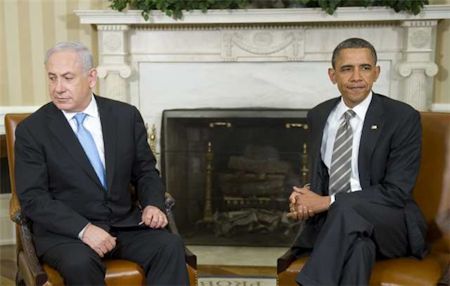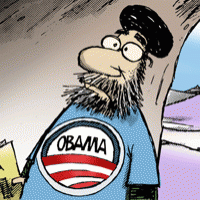![]()
RubinReports | By Barry Rubin

The body language of Benjamin Netanyahu and Barack Obama doesn’t look like close allies during a meeting in the White House, oval office, Washington, May 20, 2011. (Photo: Jim Watson / AFP / Getty Images)
President Barack Obama will visit Israel, the West Bank, and Jordan in March.
Political Analysis
I’m not against this but I think it is a mistake on Obama’s part. Here’s why.
While such a visit would resolve previous criticism that Obama never visited Israel as president, it is a mistake, especially given the timing, for a number of reasons.
— Obama will have a new foreign policy team which won’t have much time to evaluate the situation and what it wants to do. It has just been announced that Secretary of State John Kerry will visit these places in the spring. Usually the way it would be handled would be to let Kerry go and then evaluate if there was a good basis for a presidential visit.
— Presidential visits are supposed to mark achievements or to make achievements possible. A visit that does neither would be perceived as a failure and Obama would look bad. The “peace process” is going nowhere and Obama’s going will not jump start it at all. Afterward, people will be asking: Wasn’t this a policy failure?
— The timing is dangerous because it appears to reward the Palestinian Authority (PA) which rules the West Bank for having gone against U.S. policy by asking the UN to give it recognition as a state.
— No matter whether some people (albeit fewer than ever) believe in “linkage” (that is, “solving” the Israel-Palestinian conflict) will benefit U.S. interests in the region and make Arabs and Muslims like it more, the visit would have no such positive effect. Arabs and Muslims would be indifferent or see it as a pro-Israel move (no matter what he actually says); Islamists will portray it as a conspiracy that proves how evil is America and Obama. Imagine what Hamas and the Egyptian government’s leaders and media will say.
— Perhaps most problematic of all, the PA will turn a visit into a minefield for Obama, designing every detail to make it seem the president is visiting (and acknowledging) an independent Palestine. There will be the flag, the honor guard, the playing of the national anthem, the use of the term “Palestine” (rather than Palestinian Authority — what was agreed on at Oslo — or Palestinian National Authority — the term favored by the PA’s leadership).
— Whatever Obama says, no matter how much it might outrage Israel and its supporters, will be deemed insufficient for the Palestinians.
— No matter how much Obama talks of restarting negotiations or pushing for Israeli unilateral concessions, the PA won’t do it — as they refused to do in his first term — so he will look foolish. Then Obama will either blame both sides equally or just Israel. This gets him nowhere.
— The likely Israeli coalition is not going to be to Obama’s liking. Watch for his intense frown in the photographs.
— I can see there being a speech at the Israeli Knesset and at the PA’s parliament and can imagine how every line will go. It might be perfectly fine but nothing new and no one in the region will take it seriously. I guess it will be good for domestic consumption as Obama the peacemaker but will this do anything useful for him politically or for U.S. interests?
— As for Jordan, is Obama going to preach the glories of the “Arab Spring” to a country whose monarchy has been America’s most consistently faithful Arab ally and fears being overthrown by a similar movement which would only turn the country over to the Muslim Brotherhood and almost certainly lead to its embroilment in still another war against Israel?
Satirical Content
(if this offends you please don’t read it and just focus on my serious analysis)
Forgive me for saying a few things that are NOT part of my serious political analysis:
— Will Obama go to the Arafat museum to balance a visit to Yad ve-Shem (the Holocaust Museum in Israel) since he would then be both commemorating the last Holocaust and the man who tried to implement the next one?
— Will he lay a wreath at the Tomb of the Unknown Terrorist?
— Certain mass media outlets will run stories that since some friendly Israelis will line his route with nice signs (for example, We Love You, Barack!) that they like Barack more than Bibi and agree that he knows Israel’s interests better than its own leaders.
— There is a huge potential for terrible factual mistakes and turns of phrase by Obama that will go down in history. For example, will he say Jerusalem or al-Quds or both? Will he mention the pre-1967 boundaries? Will he speak publicly about Iran’s nuclear threat?
Conclusion
Of course, his main goal will be to — borrowing a President Bill Clinton phrase — feel both sides pain and cajole them to make peace so that everyone will live happily ever after. This is a noble sentiment but one that’s a bit tired after fruitlessly being mouthed for a half-century.
Speaking of Clinton, let’s remember that on his main presidential visit he told the Palestine National Council to revise its National Covenant (which called for armed struggle and wiping Israel off the map), since that was one of its commitments under the Oslo agreement. They listened to him and then just pretended very cynically to revoke it but didn’t.
Of course, if nobody reports such things then the president doesn’t look bad so perhaps that’s the way an Obama visit will turn out.
Note: last June I wrote to ask why Obama wasn’t visiting Israel before the election. At that time we didn’t know he would have a second term. In the article I made three points: he doesn’t like Israel; he feared a poor reception, and he was concerned it would undo his attempt to win support from Arabs and Muslims by distancing himself from Israel. I think all three points still are valid but presumably have been overcome by the following:
— He still doesn’t like Israel but figures he has to come once during eight years and perhaps he honestly believes he can appeal to Israel’s people over the heads of its government, having said that he knows what’s best for Israel rather than do its elected representatives;
— He feels he has won enough credibility with Arabs and Muslims (as the “patron” of the Arab Spring and the man to whom the Muslim Brotherhood owes so much),
— And he’s been reelected so who cares if he is booed a bit. Besides, faced with four more years of Obama the Israeli leadership will be extra careful to try to keep him from being unhappy.
In short, I don’t think this analysis was wrong, especially because my point was to ask why he didn’t go at a time when it would presumably have benefited him politically. Now he’s going at a time when it might damage the credibility of his policy.
Barry Rubin is director of the Global Research in International Affairs (GLORIA) Center and editor of the Middle East Review of International Affairs (MERIA) Journal. His latest book, “Israel: An Introduction“, has just been published by Yale University Press. Other recent books include “The Israel-Arab Reader” (seventh edition), “The Long War for Freedom: The Arab Struggle for Democracy in the Middle East” (Wiley), and “The Truth About Syria” (Palgrave-Macmillan). The website of the GLORIA Center and of his blog, Rubin Reports. His original articles are published at PJMedia.



 RSS
RSS










Latest Comments
Hello Mike, Thank you for your positive feedback to the article. I felt there wasn’t too much critical analysis of ...
Thanks for this considered and well constructed article. A follow up article on the manner in which the editorial contro...
THE CLUELESSNESS OF CLAIMING THAT OBAMA'S MIDDLE EAST POLICIES WERE A FAILURE CANNOT BE FURTHER FROM THE TRUTH, WHAT THE...
As long as Obama is the president of the usa do not trust the us government......
Thank you for an good read....